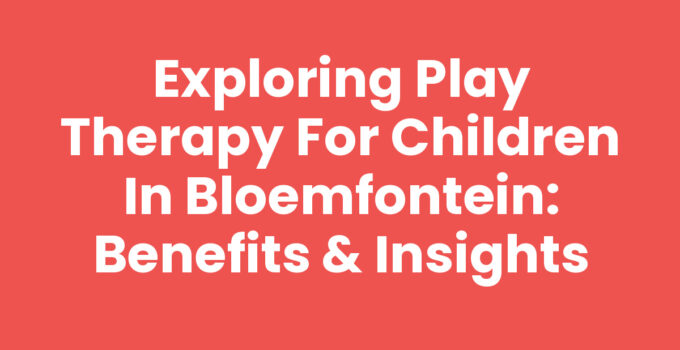Play therapy is an invaluable approach utilized by professionals to assist children in navigating their emotions, behavior, and social challenges. In Bloemfontein, this therapeutic method is becoming increasingly recognized for its ability to promote mental health and well-being among children. In this article, we’ll delve into the specifics of play therapy, its benefits, and considerations for parents seeking support for their children.
Play Therapy for Children Bloemfontein: A Comprehensive Overview
Play therapy for children in Bloemfontein is a focused therapeutic intervention that harnesses the natural way children learn and express themselves—through play. This form of therapy especially benefits children aged 3 to 12, as it allows them to communicate experiences and feelings in a context they understand and enjoy.
Here’s a step-by-step guide on how play therapy effectively works:
1. Understanding the Basics
Before diving into the process, it’s crucial to understand that play therapy can take various forms. Common modalities include:
– **Child-Centered Play Therapy:** Focuses on the child leading the play session while the therapist observes and supports.
– **Cognitive Behavioral Play Therapy (CBPT):** Merges cognitive-behavioral techniques with play, helping children change negative patterns of thinking and behavior.
– **Filial Therapy:** Involves parents or caregivers participating in the play sessions, fostering deeper connections.
2. The Initial Session
The first session typically involves an introduction where the therapist evaluates the child’s emotional and psychological state. The therapist will:
- Establish rapport with the child.
- Communicate with the parents to understand the child’s background.
- Create a safe, welcoming environment with various toys, art supplies, and materials.
3. Engaging with Play
During sessions, children engage with toys and materials that resonate with them. The therapist may introduce specific activities that can target particular issues, such as anxiety or trauma. The therapist observes play dynamics, interprets the child’s actions, and responds to emotional expressions. The goal is not to direct the child but to facilitate their exploration of thoughts and feelings.
4. Therapeutic Goals
Each child’s goals in therapy are unique, often focusing on:
– Enhancing self-esteem
– Improving communication skills
– Developing coping strategies for anxiety or depression
– Resolving trauma and grief
– Enhancing social skills
5. Parent Involvement and Follow-up
Parental involvement can be crucial. Involving parents through sessions or follow-up discussions helps reinforce the therapeutic goals outside of the play therapy environment. This may include constant feedback and strategies for parents to help their children outside therapy sessions.
See Also: Explore Vumatel Fibre Coverage in Bloemfontein Today!
The Benefits of Play Therapy for Children in Bloemfontein
Understanding the benefits of play therapy can help parents and guardians make informed decisions about seeking this type of intervention. Here are some significant advantages:
1. Non-Verbal Communication
Children often struggle to articulate their feelings verbally. Play therapy allows them to express emotions and experiences through play, acting as a proxy for speech.
2. Building Trust and Safety
In play therapy, children can develop a trusting relationship with the therapist, which is vital for healing. This safe space encourages openness and honesty.
3. Conflict Resolution
Children learn to identify their feelings and manage conflicts through guided play. It helps in reducing anxiety, improving social skills, and enhancing emotional regulation.
Recommended Reading: Netball Court Bookings in Bloemfontein: A Complete Guide
Important Considerations When Choosing Play Therapy in Bloemfontein
If you’re considering play therapy for your child, here are a few essential considerations:
1. Finding a Qualified Therapist
Research and seek out therapists who specialize in play therapy and possess relevant credentials. The therapist’s experience with children in your child’s age group is essential.
2. Understanding the Process
Be aware that the therapy process may take several sessions before significant progress is noted. Each child will respond differently and may require varying lengths of time in therapy.
3. Cost and Logistics
Discuss costs with your chosen therapist upfront, including session frequency and the potential need for extended therapy. Many therapists may offer sliding scale fees based on your circumstances.
Conclusion
Play therapy for children in Bloemfontein offers a dynamic and engaging approach for emotional development. By understanding the process, benefits, and considerations, you empower yourself to support your child’s mental health journey effectively.
Recommended Reading: Practical Legal Training Bloemfontein LSSA: A Comprehensive Guide
Frequently Asked Questions
What age group benefits most from play therapy?
Children aged 3 to 12 typically benefit most from play therapy, as it aligns with their developmental communication skills.
How long does play therapy usually last?
The duration of play therapy varies by child, but sessions usually range from a few weeks to several months, depending on individual needs.
Can parents observe play therapy sessions?
Yes, many therapists encourage parental involvement, either through observation during sessions or through follow-up discussions.



